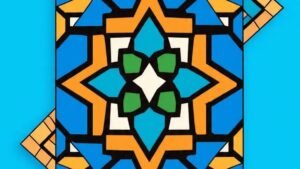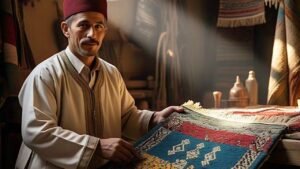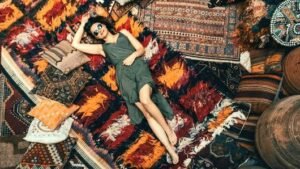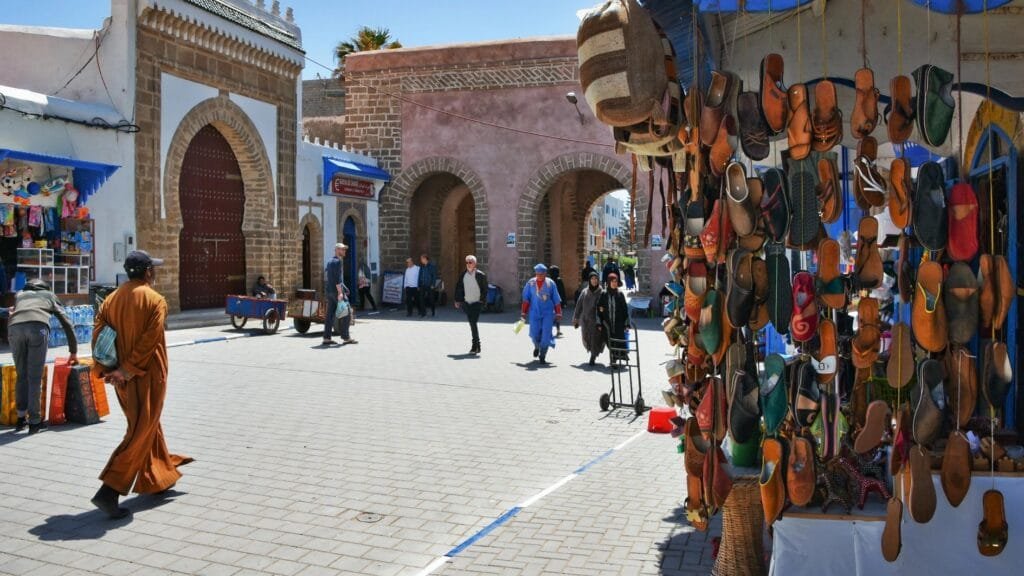
Morocco is a land where tradition, craftsmanship, and culture intertwine, producing some of the most exquisite and unique handicrafts in the world. Every handcrafted item carries the weight of history and the soul of the artisan, making each piece a work of art with a story. Whether you’re gifting a handwoven Berber rug, a delicate silver piece, or a luxurious Moroccan Caftan, Moroccan handicraft gifts represent more than just objects; they are symbols of Morocco’s rich cultural heritage. Choosing one of these carefully crafted items not only reflects an appreciation for artistry but also supports the centuries-old traditions that thrive in Morocco’s artisan communities.
Berber Rugs: Priceless Moroccan handicraft gifts
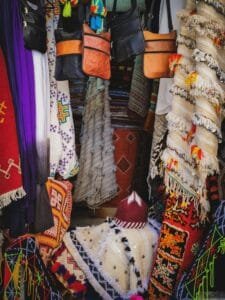
When you gift a Berber rug, you are offering more than just a floor covering; you are sharing a piece of Morocco’s history and cultural identity. Woven by Berber women in remote villages of the Atlas Mountains, each rug tells its own unique story. The bold patterns and vibrant colors are not randomly chosen but are symbolic of the landscapes, beliefs, and experiences of the women who create them. Whether geometric or abstract, the designs reflect the ancient traditions passed down through generations, making these rugs a true embodiment of Moroccan culture.
The craftsmanship behind a Berber rug is nothing short of extraordinary. From shearing the sheep to dyeing the wool with natural colors, the process is entirely manual, requiring months of work to complete a single piece. The natural dyes, derived from plants and minerals, create hues that are both vivid and earthy, a direct reflection of Morocco’s diverse landscapes. This attention to detail ensures that each rug is a one-of-a-kind piece, brimming with authenticity and warmth.
As a Moroccan handicraft gift, a Berber rug is not only a striking addition to any home but also a lasting symbol of tradition. It represents the connection between the artisan, their history, and the recipient of the gift. Whether displayed on the floor or hung as a tapestry, it will continually remind the owner of Morocco’s ancient weaving traditions and the deep-rooted cultural pride of its people.
Silver Goods: Shining Pieces of Moroccan Heritage
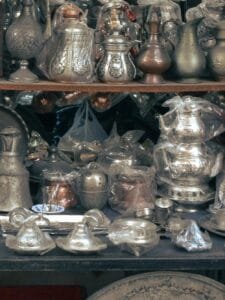
In Morocco, silver goods have been treasured for centuries, often passed down through families as heirlooms. Artisans in regions like Tiznit and Marrakech craft stunning silver pieces, ranging from intricate tea sets to finely detailed jewelry. Silver is considered not only a metal of beauty but also one that holds deep spiritual significance in Moroccan culture. For this reason, giving silver as a gift is a profound gesture, symbolizing purity, protection, and continuity.
Each piece of silverware, whether it be a tray, a tea set, or a piece of jewelry, is made by hand using traditional techniques that have remained unchanged for generations. The artisans hammer and engrave the metal with precision, incorporating motifs inspired by Morocco’s Islamic, Berber, and Andalusian influences. These designs are often intricate, featuring arabesques, geometric patterns, or floral motifs, all of which add to the item’s cultural richness and aesthetic appeal.
As Moroccan handicraft gifts, silver goods offer a unique blend of beauty and functionality. A silver tea set, for example, is not just a practical item but a centerpiece in Moroccan hospitality, used during traditional tea ceremonies that are central to social life in Morocco. To give silver is to offer not only a beautiful object but a symbol of Moroccan culture and the artisanal skill that has been refined over centuries. It is a gift that will be cherished for both its craftsmanship and its cultural significance.
Leather Goods: Durable Moroccan Handicraft gifts
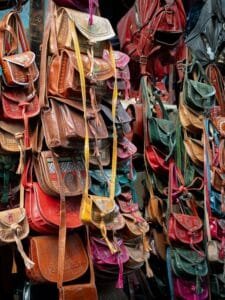
Among the most iconic Moroccan handicraft gifts, leather goods stand out for their exceptional quality and timeless appeal. Moroccan tanneries, particularly in Fes and Marrakech, are famous for producing some of the world’s finest leather, using traditional methods that date back centuries. Whether it’s a finely crafted leather bag, a pair of traditional slippers known as babouches, or an intricately designed belt, these items are made with care and precision by master artisans who have inherited their skills from previous generations.
The process of creating Moroccan leather is an art in itself. Animal hides are tanned using natural substances, such as plant oils and lime, before being treated and dyed in large, sun-soaked vats. The vivid colors that result, from rich ochres to deep reds and blues, are one of the hallmarks of Moroccan leather. This labor-intensive process produces leather that is not only beautiful but also incredibly durable, making it a practical gift that will last for years.
Leather goods from Morocco are versatile and make ideal gifts for anyone who appreciates both luxury and craftsmanship. From handbags to wallets, each piece is unique, carrying the personal touch of the artisan who made it. When given as a gift, these leather items symbolize the durability of Moroccan traditions, passed down through generations of artisans who continue to preserve the country’s legacy of exceptional craftsmanship.
Copper Cookware: Tradition Served with Every Meal
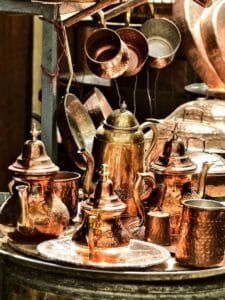
Moroccan cuisine is a celebration of flavors, colors, and textures, and the cookware used in preparing these meals is just as remarkable. Copper cookware, hand-hammered by artisans in cities like Marrakech, is not only functional but also a beautiful symbol of Moroccan culinary tradition. Small copper tajines, tea kettles, and pots are not just kitchen tools but exquisite pieces of craftsmanship that make for perfect Moroccan handicraft gifts.
The process of creating copper cookware is meticulous. Artisans shape the copper by hand, hammering it into the desired form before adding decorative touches that make each piece unique. These cookware items are favored not only for their beauty but also for their ability to conduct heat evenly, making them ideal for preparing traditional Moroccan dishes like tajine or couscous. A small copper pot, for example, is not just a functional gift but a symbol of the warmth and hospitality of Moroccan homes.
When given as a gift, Moroccan copper cookware offers the recipient a tangible connection to Morocco’s culinary heritage. It represents the heart of the Moroccan kitchen, where meals are prepared with love and shared with family and friends. The vibrant shine of the copper, along with its enduring practicality, makes it a gift that will be treasured in any home, whether used for cooking or as a decorative piece.
Embroidered Handkerchiefs: Treasures of Moroccan Craft
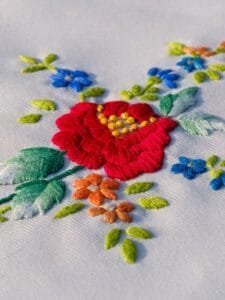
Among the treasures of Moroccan handicraft gifts, embroidered handkerchiefs, particularly those adorned with Fassi or Rabati embroidery, hold a special place. These delicate pieces of art are not just accessories but a symbol of refinement, tradition, and the meticulous craftsmanship that defines Moroccan artisanal culture. Embroidered handkerchiefs are often given as meaningful gifts, cherished for their elegance and the intricate stories woven into their threads.
Fassi embroidery, known for its complex geometric patterns, originates from the city of Fes, a historic center of craftsmanship. Each handkerchief is carefully crafted by hand, with artisans using silk or gold threads to create designs that reflect the city’s rich cultural heritage. The patterns, often symmetrical and intricate, showcase an unmatched level of detail. Meanwhile, Rabati embroidery, hailing from Morocco’s capital, Rabat, is recognized for its floral motifs and softer, more flowing designs. These handkerchiefs are both practical and decorative, making them perfect as gifts for special occasions such as weddings or religious celebrations.
The process of creating these embroidered handkerchiefs involves hours of dedicated work. Artisans, who have learned these techniques from generations before them, stitch every detail with precision. Whether adorned with traditional motifs or more modern patterns, the craftsmanship reflects the pride of Morocco’s artisanal heritage. The handkerchiefs can be personalized with initials or specific designs, adding a personal touch to an already unique item.
Textiles: Luxurious Moroccan Handicraft Gifts
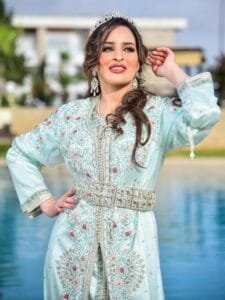
Among the most iconic of Moroccan handicraft gifts are the exquisite textiles that make up traditional Moroccan attire, particularly the djellaba and caftan. These garments, worn during special occasions and even in daily life, represent not just fashion but the centuries-old craftsmanship and deep-rooted cultural heritage of Morocco. Whether gifted to a loved one or bought as a keepsake, a beautifully crafted djellaba or caftan brings with it a sense of elegance, history, and artistry.
The djellaba, a long, flowing robe with a pointed hood, is often made from fine wool or soft cotton. Depending on the region, the designs vary, with some incorporating delicate embroidery along the edges or across the chest. Artisans use traditional methods to weave and sew these garments, passing down the knowledge from generation to generation. While many djellabas are monochrome, festive ones feature vibrant colors or rich patterns, making them ideal for celebrations or as unique gifts. They embody comfort and style, blending practicality with aesthetic appeal.
On the other hand, the Moroccan caftan is perhaps the most elegant gift one could offer. Worn mainly during weddings or formal events, the caftan is a long, embroidered dress that can be lavishly decorated with sequins, intricate beadwork, and hand-sewn gold thread. Skilled artisans in cities like Fes, Rabat, and Casablanca craft these dresses with remarkable attention to detail, ensuring each piece is a work of art. Offering a caftan as a gift is akin to sharing a piece of Moroccan history and artistry, as it symbolizes the pinnacle of Moroccan textile craftsmanship.

